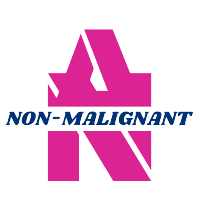WELCOME TO NON MALIGNANT’S MONTHLY NEWSLETTER
Family History : A Risk For Cancer
Hey there, wellness warriors! It’s wonderful to reconnect with our supportive readers
When someone in the family previously had suffered from cancer or is currently facing cancer, it often raises concerns regarding whether the other family members are also at a risk of developing the cancer.
In this newsletter we will uncover the reality regarding these concerns by exploring family history : a risk factor for cancer. Also we will see how one can find out whether they are at a risk for cancer because of their family history. Further we will also uncover an emerging technology in early cancer detection.
Family history for cancer and its types
Family history risk for cancer refers to how having relatives with cancer can influence your own risk of developing the disease.Whether there is an increased cancer risk for other family members depends on the type of cancer that has occurred in the family.
Familial cancer : In this type of cancer, the family members may share certain lifestyle factors, such as diet or environment, which could increase their cancer risk. Or they may have some genetic similarities that make them more prone to that particular cancer, but the genetic link is not very strong or well-defined. So while cancer seems to “run in the family,” it’s not necessarily passed down in a clear pattern from parents to children.
Hereditary cancer : This is when a specific genetic mutation or change is passed down from parents to their children. This mutation significantly raises the risk of developing certain cancers. If one parent has this mutation, each child has a 50% chance of inheriting it. Families with hereditary cancer often have multiple relatives diagnosed with the same type of cancer at a younger age than usual.
Sporadic Cancer : It is the most common type of cancer. It occurs by chance in people who do not have a strong family history of that particular cancer. Sporadic cancers are not caused by an inherited genetic mutation passed down from parents to children. Instead, sporadic cancers develop due to random genetic changes that occur in a single cell over the course of a person’s lifetime. These genetic changes, called mutations, cause the cell to grow and divide uncontrollably, leading to a tumor.
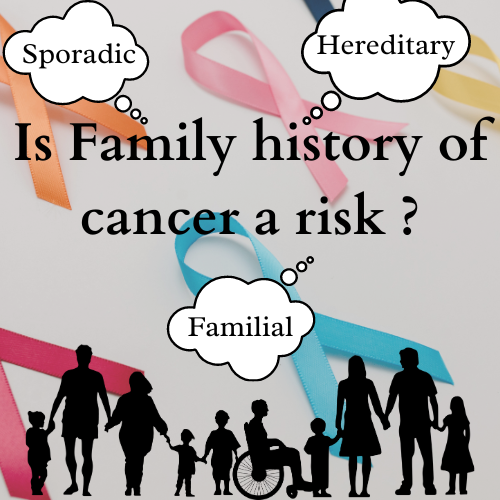
Remember having a family history of cancer doesn’t mean that you will develop cancer. It only means that you have an increased risk of cancer.
How does cancer risk vary between sporadic, hereditary, and familial types ?
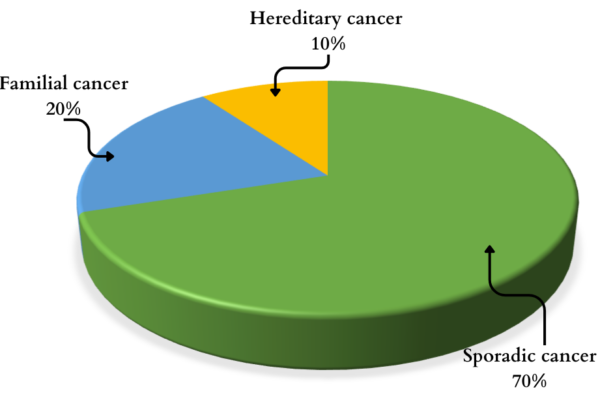
The pie chart illustrates the proportion of different types of cancer that can be present in a family history of cancer
For Sporadic Cancer:
If one family member has sporadic cancer, the risk for other family members is generally similar to that of the general population. This means that family members do not have a significantly increased risk solely based on that one case, as sporadic cancers are typically due to random mutations and environmental factors rather than inherited genetic factors. Therefore, family members have the same chance of developing cancer as anyone else.
For Hereditary Cancer:
In cases of hereditary cancer, if a family member has a known hereditary cancer syndrome (like BRCA mutations for breast and ovarian cancer), the risk for other family members can be significantly higher. For example, if a parent carries a hereditary mutation, each child has a 50% chance of inheriting that mutation, which can greatly increase their risk of developing specific cancers. Hereditary cancers account for about 5-10% of all cancers, and affected families often see multiple relatives diagnosed with the same or related cancers at younger ages.
For Familial Cancer:
Familial cancer indicates a moderate increase in risk due to a combination of genetic and environmental factors. If one family member has familial cancer, the risk for other family members is higher than that of the general population but not as high as with hereditary cancer. Studies show that the risk can be about two-fold compared to individuals without a family history. For some cancers, like breast or colorectal cancer, the risk can increase further depending on the number of affected relatives within the family.
How can one find out whether they have an inherited gene because of their family history of cancer ?
To understand inherited cancer risk due to family history, individuals can follow a systematic approach as follows
– Gather information about their family’s medical history, focusing on any instances of cancer, including the types and ages at diagnosis.
– Look for patterns, such as multiple cases of the same or related cancers, especially among younger relatives.
–Consulting a healthcare professional is crucial, as they can evaluate the family history and determine if there is a significant risk of hereditary cancer.
–If warranted, the healthcare provider may recommend genetic testing to identify specific gene mutations associated with increased cancer risk.
discussing the results with the healthcare provider can help individuals understand their risk and explore preventive measures or early screening options.
This proactive approach can help individuals to make informed decisions about their health based on their family history of cancer.
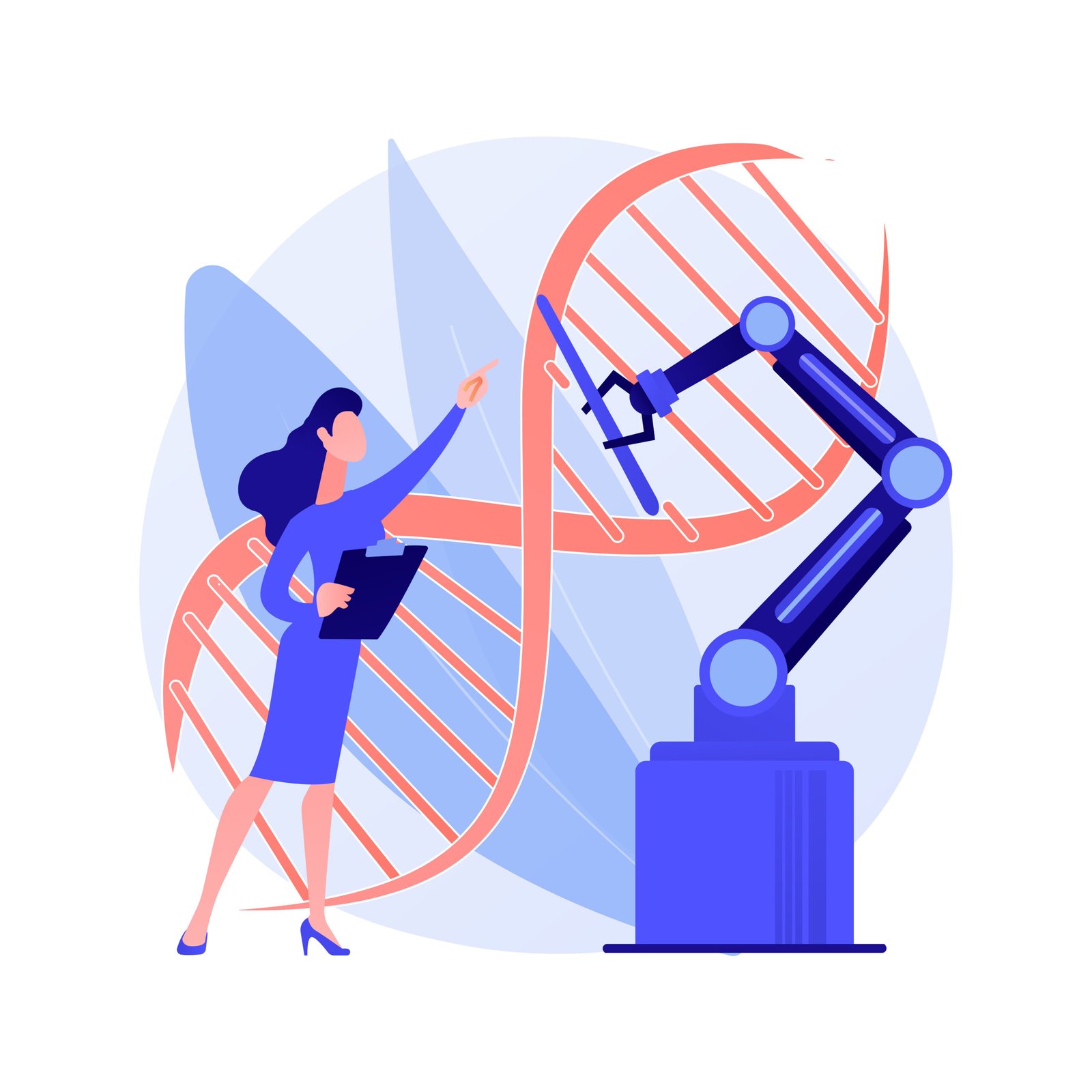
Emerging technology in early cancer detection
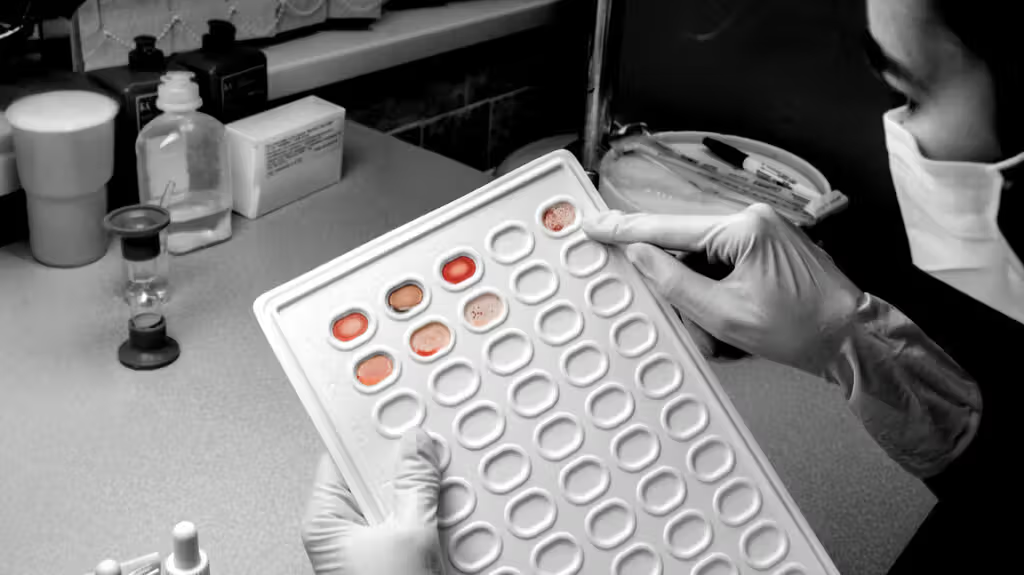
New blood test shows promise in detecting 18 types of cancer
“Advancing early cancer detection.” A new blood test has shown promising results in detecting 18 types of cancer by analyzing protein biomarkers in the blood. In clinical studies, this test achieved 93% accuracy in detecting stage 1 cancers in men and 84% in women, highlighting its potential as an early diagnostic tool. By focusing on the proteome the complete set of proteins in the body-the researchers were able to identify cancers that currently lack effective screening methods. This innovative approach could revolutionize early cancer detection, allowing for timely intervention when treatment options are most effective.
“A breakthrough in precision medicine.” The test’s ability to identify the origin of cancer in over 80% of cases underscores its potential to improve current screening methods, which often rely on invasive or expensive procedures. By utilizing a specific set of biomarkers, the test enhances accuracy and reduces the chances of missing early-stage cancers. While further research is needed to validate its use on a larger scale, this development represents a significant step forward in cancer screening, offering the possibility of integrating a simple blood test into routine healthcare and improving outcomes for patients worldwide
Did you like this newsletter
Know who we are
Non Malignant is a startup aimed at detecting and eliminating cancer before symptoms appear. Non Malignant is housed at Mission Unicorn which is an ideation and incubation lab in Vidyalankar.
Non Malignant is also a service provider for all information regarding detection, cure, rehabilitation and prevention of cancer.
Stay connected with us!
Get updates, valuable insights, and important announcements delivered directly to your inbox. Join our mailing list today and be the first to know about the newest developments, events, and resources available to you
hello@nonmalignant.org
